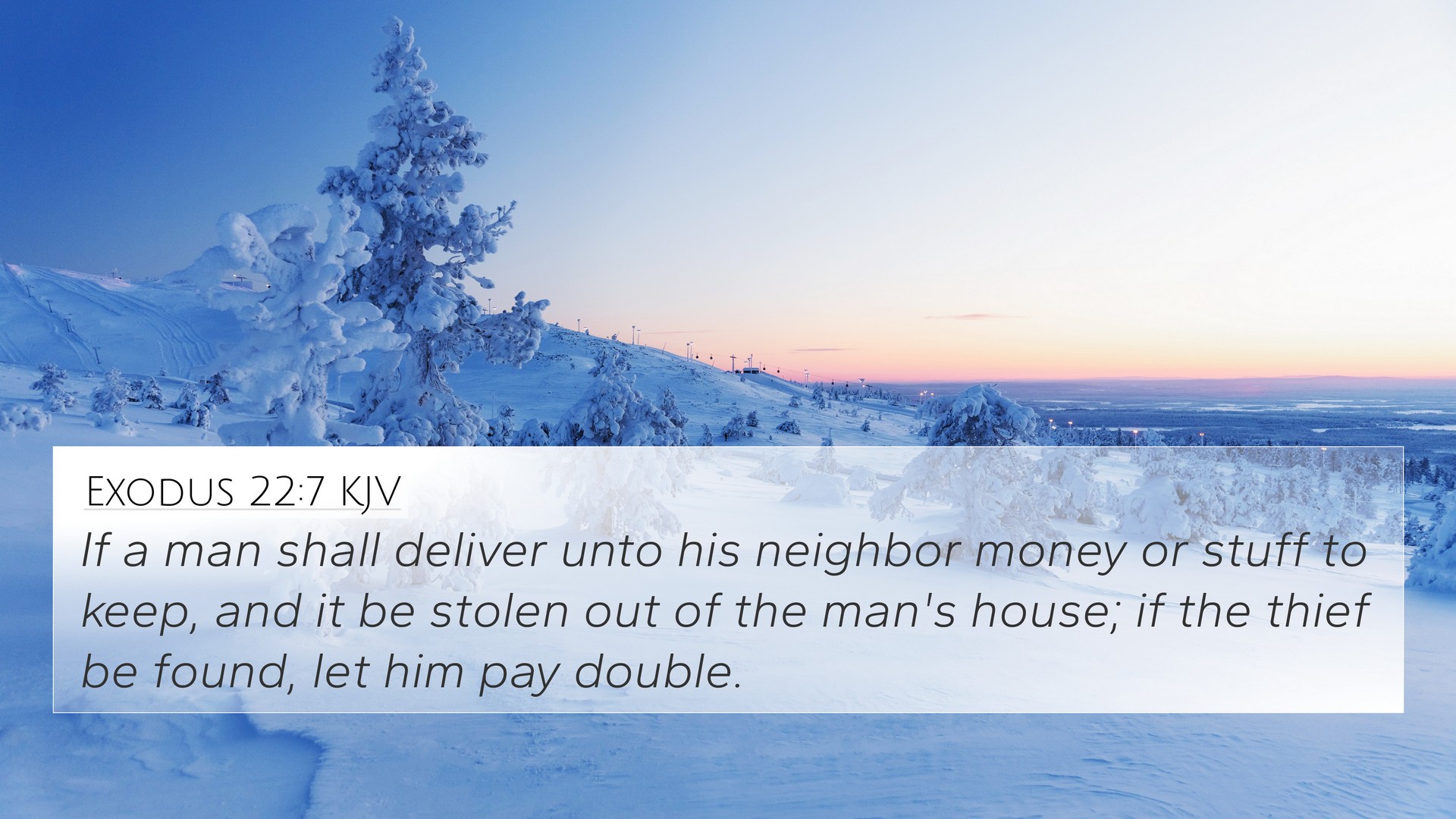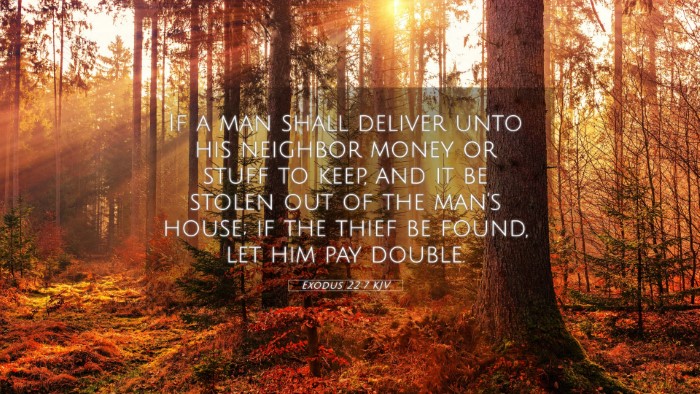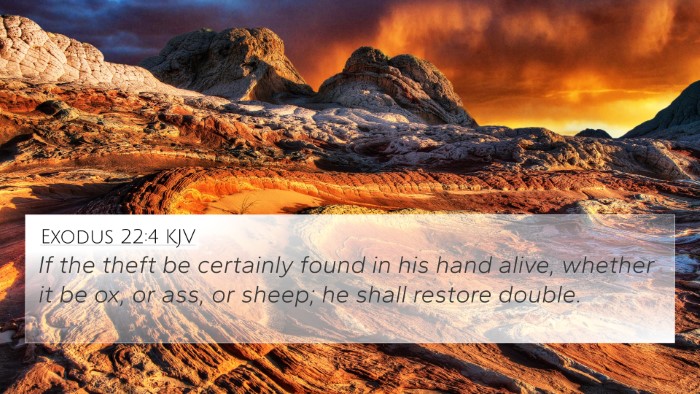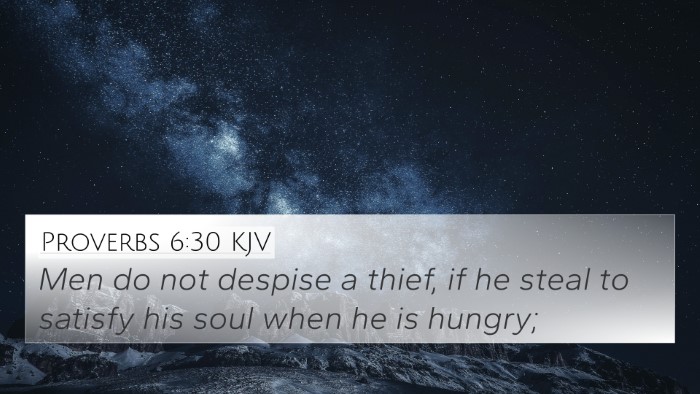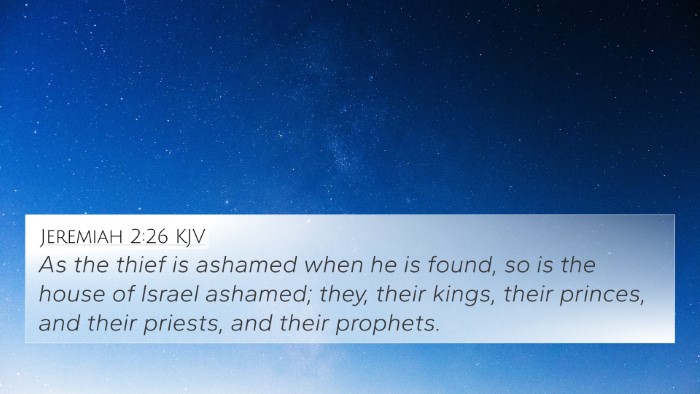Understanding Exodus 22:7
The verse Exodus 22:7 is crucial in understanding Biblical principles regarding trust, responsibility, and the treatment of others' property. This verse states:
"If a man delivers to his neighbor money or goods to keep safe, and it is stolen out of the man's house, then if the thief is found, he shall pay double." (Exodus 22:7, ESV)
Summary of Exodus 22:7
This passage reflects on the obligations and liabilities surrounding the safekeeping of property. Here’s a thematic exploration:
- Trust and Responsibility: The essence of this verse revolves around the trust placed upon individuals when they are entrusted with someone else's possessions. This instills a deep sense of responsibility.
- Justice and Accountability: The stipulation that a thief must repay double indicates the seriousness of theft in the eyes of God. It represents a system of justice that God advocates, ensuring that wrongdoers face consequences.
- Restitution: The idea of restitution for what is lost underscores the importance of fairness and recovery in relationships.
Commentary Insights
From Matthew Henry
Matthew Henry elaborates on the moral implications behind this law, noting that the command promotes honesty and the good management of trust. It advocates for communal living and accountability, reinforcing that one must carefully manage what has been entrusted to them.
From Albert Barnes
Albert Barnes emphasizes the legal structure surrounding the protection of property, discussing the ramifications of failing in duty. Barnes notes that this principle seeks to establish boundaries that prevent theft while emphasizing that those who take on the responsibility must execute it diligently.
From Adam Clarke
Adam Clarke points out that this verse not only addresses the immediate situation of theft and restitution but also speaks to the broader values of trustworthiness and the significance of community standards in dealing with personal property. Clarke highlights the intention of God in establishing these laws for societal harmony.
Bible Verses Related to Exodus 22:7
- Leviticus 6:2-5: Discusses the guilt and restitution required in cases of theft.
- Proverbs 6:30-31: Warns against the consequences of theft and the expectation of repayment.
- Luke 19:8: Zaccaheus’ commitment to repay fourfold what he stole illustrates New Testament principles of restitution.
- Exodus 21:37: Explains similar laws regarding theft and restitution.
- 1 Peter 2:12: Encourages honorable behavior among people, which echoes the theme of responsibility in stewardship.
- Matthew 5:40: Mentions going beyond mere restitution in terms of one’s possessions.
- Deuteronomy 24:7: Discusses the seriousness of kidnapping and the requirement of justice for stolen property.
Comparative Bible Verse Analysis
To fully grasp the significance of Exodus 22:7, one must analyze its connections with other scriptures:
- Connections to the New Testament: The teachings of Jesus regarding honesty and personal integrity can be linked back to the principles established here.
- Inter-Biblical Dialogue: The connection between Old Testament laws and New Testament teachings provides insights into God’s consistent message regarding stewardship and justice.
- Thematic Cross-Referencing: The themes of theft and accountability in Exodus resonate deeply within various scriptures throughout both Testament sections, offering a comprehensive moral framework.
Tools for Biblical Cross-Referencing
To deepen understanding of Exodus 22:7, several tools can aid in identifying connections and thematic parallels:
- Bible Concordance: A useful tool for locating specific verses and themes throughout scripture.
- Cross-Reference Bible Study Materials: These materials allow detailed exploration of related verses and enhance overall comprehension.
- Bible Cross-Reference Guide: Guides provide structured insights and interpretations that can enrich personal or group Bible study.
Conclusion
The verse Exodus 22:7 not only examines the legal responsibilities surrounding property ownership but also reflects deeper moral and spiritual truths about trust, stewardship, and accountability that remain pertinent today. By understanding this verse and related scriptures, individuals can apply these timeless principles to their lives, ensuring ethical interactions within their communities.
